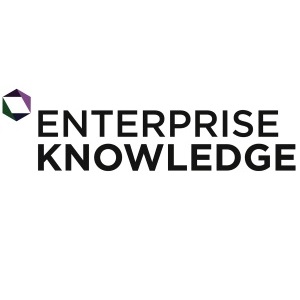Transformation & Change108
Interview with Enterprise Knowledge
We sat down with Katy Saulpaugh of Enterprise Knowledge for an interview about their involvement with the Business Agility Institute.
Evan Leybourn, Katy Saulpaugh
March 4, 2018
We sat down with Katy Saulpaugh of Enterprise Knowledge for an interview about their involvement with the Business Agility Institute.
Evan Leybourn, Katy Saulpaugh
March 4, 2018
 Business Agility is a complex topic; from organisation design, adaptive leadership, governance & strategy to agile practices outside IT - it means something different to different organisations. One of the reasons we put on the Business Agility 2017 conference was to explore these topics and bring together leading organisations from around the world. In the lead-up to the conference, we're going to showcase some of the companies who are supporting us and explore what business agility means to them.
Business Agility is a complex topic; from organisation design, adaptive leadership, governance & strategy to agile practices outside IT - it means something different to different organisations. One of the reasons we put on the Business Agility 2017 conference was to explore these topics and bring together leading organisations from around the world. In the lead-up to the conference, we're going to showcase some of the companies who are supporting us and explore what business agility means to them.
I recently had the opportunity to speak with Katy Saulpaugh from Enterprise Knowledge. In their own words, "Enterprise Knowledge (EK) is a consultancy from Arlington, VA that is dedicated to providing unmatched consulting services in the areas of Knowledge and Information Management, Agile Transformation, and Software Development. Success for EK means helping our clients to harness the full spectrum of knowledge so that their information can be efficiently found, used, and reused."
Let's start at the beginning. What does business agility mean to you?
At EK, business agility means using the agile mindset to help our clients realize the full value of their organizational information and knowledge, collaborate more effectively, and align their strategic goals and needs. This value goes far beyond IT: it can range from the tacit experiences of employees to explicit documents and records to better structured teams and processes. We unlock this value by applying customer collaboration in areas where it’s often neglected and leveraging data to improve knowledge practices in an iterative, evolutionary way. It also means when we are involved in agile transformations that we focus our attention on many factors outside of IT to look for roadblocks and solutions.
Why is it important that your business operates in an agile way?
At EK, we have found business agility to be extremely useful in knowledge and information management, especially when our clients are working with limited resources. For example, we apply an agile approach to managing taxonomy in large content stores (see specific example below). A great deal of Knowledge and Information Management work fails because it isn’t firmly grounded in the needs of the end users and doesn’t provide sufficient business value. Our Agile approaches ensure we’re focused on the end users and can drive adoption through their iterative involvement.
What have been some of the biggest benefits you've seen? What has been the response from your clients or customers?
At EK we find the most successful projects involve not just agile software development but also content creation, governance, and information architecture. For example, at the National Park Service, our iterative design and development approach, which engaged the stakeholders and end users, resulted in strong buy-in and adoption of a new system. From the outset, the tool represented the needs of the end users and was familiar to them, because they had a hand in designing it.
Where did you start, what triggered you to become and agile organisation?
With decades of experience in the industry, our Principals founded EK in order to fill a glaring gap in the industry – all too often, the end users in business critical knowledge and information management systems were ignored or overlooked. At EK, we know how to engage end users to ensure the systems are designed for them, to truly address their needs. We work as trusted partners to not only find the best solution, but the most achievable as well.
Today, EK takes an agile approach to all its business practices – from our workshops designed to restart an agile transformation to internal practices such as an employee-led interview process and a kanban approach to business development.
What are the top 3 indicators that show an organisation is ready to take agile outside IT?
What do you see are the biggest obstacles companies face in being agile?
Lack of true executive investment is the biggest issue we’ve encountered. Leaders will need to change their behaviors to truly be agile at an organization level – they can’t outsource being agile to their teams or to consultants.
Why should someone come to Business Agility 2017?
We often see Knowledge and Information Management initiatives fail because they are overly complex or do not address the specific needs of the organization and its end users. Business agility can help overcome these challenges – and Business Agility 2017 showcases some of the finest thinking happening in this space to date, including from EK’s own agile practice lead Katy Saulpaugh.
Enterprise Knowledge is a Supporting Sponsor for the Business Agility Conference in New York City on 23-24 February 2017.
Please subscribe and become a member to access the entire Business Agility Library without restriction.